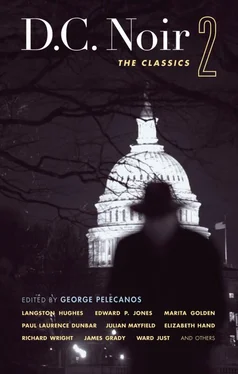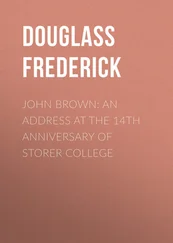Having said this, Dr. Reed posted a notice on the bulletin board outside of the department office that read:
ATTENTION
ALL MUSIC MAJORS
It is strictly forbidden to use the practice rooms for anything other than the study of music directly related to the concerns of the department.
DR. ARNOLD REED
CHAIRMAN OF THE DEPT. OF MUSIC
Needless to say, we constantly disobeyed this directive. No one was ever caught. But it was said that Dr. Reed had spies who reported on the activities of the music majors. Someone tapped on the door. I stopped abruptly. A pair of light brown eyes peered through the little window in the door. I opened it slowly; it was the tall ascetic student from the rally. Up close, he was very handsome, much more than I had previously thought. He was inside of the little room now.
“Sorry to disturb you,” he said, “I was passing this room when I heard your playing — beautiful.”
“Thank you. I thought you were one of Reed’s mysterious spies.”
“Yes, Dr. Reed … He’s one of our targets.”
“Targets?”
“Yes, he is a running-dog lackey. And we want him out of this university.”
“But why?”
“Because he’s not black enough.”
“Black?”
“Not physically, but spiritually … He’s one of those super-brainwashed Negroes who believes that we can’t be educated unless we become mentally and culturally whitened.”
“I see,” I said softly. There was a long pause. I glanced at my music stand.
“What is your name, Sister?”
I was taken back not so much by the word “sister,” but there was something special about the way he said it. A warm blue wave passed quickly over me; and in a flash I felt our future closeness.
“Linda.”
“My name is Eugene, but I’m thinking about changing it.”
“Changing it?”
“It lacks power.”
“Power? What does your name have to do with power?”
“I don’t know … That’s what I’m trying to find out … But — Linda what?”
“Frazier,” I said.
“Well, Linda, we must claim this century in our name. Do you understand …?”
And then he sat down at the piano and played a variation of my granddaddy’s blues. I joined in, and we played together until the night watchman came to close the building. Then I knew it was clear, I had to fall in love with him.
Later, we walked across town and surveyed the burned-out stores in the riot corridor. “The people have spoken,” he said quietly, “but it is us and future generations that will make the revolution.”
“How?” I said.
“We must each find a way … I’m going in law … Jennie’s got her plan …”
“Any place for a violinist in the revolution?” I laughed.
We had crossed the street and were looking at the titles in the Drum and Spear bookstore: The Wretched of the Earth, Muntu, Don’t Cry, Scream, Black Fire, Toward the African Revolution, The Collected Works of Marcus Garvey, Song for Mumu, The Dead Lecturer, The Selected Military Writings of Mao Tse-Tung …
“We’re going to start by dealing with the administration.”
“What’s gonna happen?”
“Something that should have happened a long time ago.”
I certainly don’t want to be involved in any kind of mess, I thought, not now with only a month to go before I graduate … My mother would kill me.
“You should talk to Jennie.”
“I don’t know her, but she seems so hard.” I tried not to show any jealousy.
“Not hard. Determined. The Sisters will have to make the revolution also. Jennie is a poet and a committed revolutionary.”
From the tone of his voice, I could easily surmise that he really admired her. I had only known him for two hours, and already I was jealous of her.
“We’re having a meeting tomorrow. You should stop by … Stokely and Marion will be there. Plus some people from Philly … a group called R.A.M.”
“Ram?”
“The initials stand for the Revolutionary Action Movement.”
“If I get a chance, I’ll check it out.” I was lying. This was going too far.
It was a clear night. We lingered for a moment in front of the large apartment building that the university had purchased and converted into a dormitory. Then he walked me to the security desk as the armed night guard eyed him suspiciously.
Looking around the foyer, he said: “This place is an armed camp since the rebellion.” The guard wore what I later learned was a .38 caliber police special. Eugene grasped my hand and shook it gently. “Keep on pushin’,” he said and walked out of the door.
My heart was jumping like crazy when I got in the elevator. He was nice, but he was a little strange. I tried picturing him sitting with us back home at dinner. I strained to imagine how my bank executive father would talk to him. Would they clash, and ruin dinner? Or maybe they would just talk about sports and money like most men did. But what would they think of me?
I entered my room. My roommate was sleeping, but the radio was still on. I turned it off, undressed, and then stood before the mirror stark naked. I checked out my hips and thighs. I turned around sideways to check out my behind. I touched myself all over. My hands were very hot and moist. I massaged my face with cold cream. Then I turned off the light and sat on the edge of the bed in the dark, thinking …
As I dozed off, my ghostly twin smiled in the fog at the crossroads … Granddaddy’s blues echoed in the distance over the cool murmur of rivers …
We met for lunch the next day. That was nice. But then I didn’t see him again for several days. With a great deal of effort, I suppressed the storm that raged inside of me. After all, wasn’t I a senior — not just a senior, but a mature senior? I’m not a genius, but for the most part, with painful effort, I always manage, manage somehow, to pull through, sometimes with honors even. I guess I get my staying power from my father, who really wanted a son, but who, as my mother tells it, jumped with joy when I was born. I am not frivolous. I play to win.
It was mother’s wish that I major in music. She had wanted to be a classical pianist and concertize all over the world. She was a child prodigy, and depending on your point of view, that was either a curse or a blessing. It had all come to nothing. After a meteor-like burst of fame, it had suddenly all come to nothing. The novelty wore off. And against Daddy’s wishes she ended her professional career. And then they had me. And that was that.
The note I held in my hand was from Dr. Reed. I sat outside of his office that morning nervously chatting with the secretaries in the office. They were talking about the riots.
“Them folks sure showed their asses over in Northeast where I live. Grabbing junk out of Allen’s and Woolworth’s and next to that the liquor store. Girl, you should have seen that mess they were dragging out of the Lerner shops …”
Her intercom buzzed. She picked up the phone.
“You may go in now, Miss Frazier … And good luck, child.”
What did she mean, good luck?
Dr. Reed’s back was turned to me as he looked out of the window onto the campus green. He was a dark, pompous man who clearly thought highly of his long-standing success. He held what looked like a list of grades in his hands. I stood there uncomfortably for a moment. Still looking out of the window, he said: “Have a seat, Miss Frazier.” Then he slowly spun around in that plush leather chair. The wall behind him was full of plaques and photographs. In each photograph, he was giving or receiving some kind of award. His PhD diploma was prominently displayed between two cheap reproductions of Renoir and Degas.
Читать дальше











